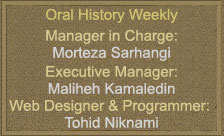| No. 354 | 19 June 2018 |
Micro Oral HistoryThe development of the humanities influenced by necessities in the bout of time and as a result is updated and still in need of further development. The postmodern trend is like a mill that, in its own words, sets the prose and narratives in the field of human sciences in small, but effective, attractive and engaging pieces with due consideration of the capabilities, talent and pace of the current generation.Along with memories of Pilot Nasser ZhianFrom reconnaissance to commandership of an operationZahra Abouali has had an interview with pilot Nasser Zhian part of which has been given to the website of Iranian Oral History. In this interview, this aviation pilot has retold his memoirs about being appointed as a commander to the operations in which he had taken part.The questions of oral historys interview (part I)A Strong Interview Is Tied with ResearchFollowing report is based on an invitation in which history experts are asked questions about oral history. In this regard, one of experts, as his perspective, has answered to one of questions titled "what are characteristics of the questions of oral historys interview"; Kianoush Haftlang (PhD) presented his responses in the form of notes that we will read these comments as follows.About documents from 1968 to 1978Documents that are important for oral historyPosition of documents is important in oral history. Author of such works should refer to valid documents for being the best knowledgeable on the subject. Documents produced in law enforcement, security or political and administrative institutions are important in oral history depending on type of producer institution and organization, being intimate or distance of reporter to intended event or subject.Memories which Are Narrated about Imam KhomeiniWe are passing another Khordad (May and June), and we again are approaching the 14th and 15th of Khordad. In this year Khordad, we arrived at the 29th anniversary of Imam Khomeinis death, and the 55th anniversary of beginning of Imams Islamic Movement; a movement that in light of it people of Iran and their revolution have become known around the world, and achieved a special status. Oral History Weekly Magazine Aims and Regulations
Oral History Weekly Magazine wishes to create a suitable place for thoughts and idea development; Its main field would be “Oral History” and subjects as telling & writing memoirs, writing diaries, travelogues, chronologies, and all other subfields of history which are presented in the form of news, articles, reports, notes, interviews and memoirs can be included. There is no limitation on the length of would-be-sent materials. Mentioning the name, academic background and email is necessary. Articles with complete references and bibliography are more credited and an abstract would quite helpful. Weekly is not about to publish any material consisting insults and libels about other people or anything that brings anxiety to public opinion. Weekly can edit and translate the received materials. The published articles and materials are only the writer’s ideas and Oral History Weekly Magazine has no responsibility about their content. |
 Memoirs of Marzieh Hadidchi (Dabbagh) (Part 45) Edited by: Mohsen Kazemi Tehran, Sooreh Mehr Publications Company 2002 (Persian Version) Translated by: Zahra Hosseinian
Landlord-peasant struggle Despite the occurrence of the Islamic revolution in Iran, establishment of justice, and elimination of oppression and discrimination and class distinction, still in some parts of the country tribal chiefs and landowners did not hear (or did not want to hear) the voice of the revolution and they insisted on their void procedure and oppression and exploiting peasants.    |
